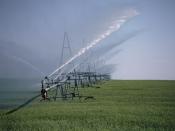Falcon, Walter P. August 9-12, 1970. The Green Revolution: Generations of Problems. Economic Development Report. No. 154, 1-30.
The Green Revolution refers to dramatic increases in cereal-grain yields in developing countries beginning in the late 1960s. It is due largely to use of genetically improved varieties and short-stemmed, disease-resistant varieties that excelled at converting fertilizer and water into high yields. The improved seeds were instrumental in boosting Mexican wheat production and averting famine in India and Pakistan, earning the 1970 Nobel Peace Prize for American plant breeder Norman E. Borlaug, leader of the Mexican wheat team. By 1992, the system included 18 centers, mostly in developing countries, staffed by scientists from around the world, supported by a consortium of foundations, national governments, and international agencies. In order to raise income in the economy as a whole, more improvements need to be made such as reducing identified consequences of the Green Revolution. Some of which pose threats to social stability and to continued economic progress.
The ability of improvements in agriculture lie in new technologically improved strains of rice and other commodities aimed to increase production and income. Walter P. Falcon discusses generations of problems resulting from the Green Revolution. He describes significant increases in some regions, but he also says other regions decreased in food production. New seed strains in some regions produced high yields because of controllable irrigation, but in other regions, there was no increase in output. There is a need for controlled irrigation in these regions, and that requires the knowledge to plan, the money to build, and similar duplication in surrounding farms. Falcon points out that adaptation is urgently necessary, it has been for many generations. I see how limited a solution the revolution is due to accentuating inequalities amongst farms. I...



Iron Paper
The introduction is introduced very well.
kho786, also presented a great overview on agricultural production. You provided background information that is very vital. The structure of the paper is well too.
4 out of 4 people found this comment useful.